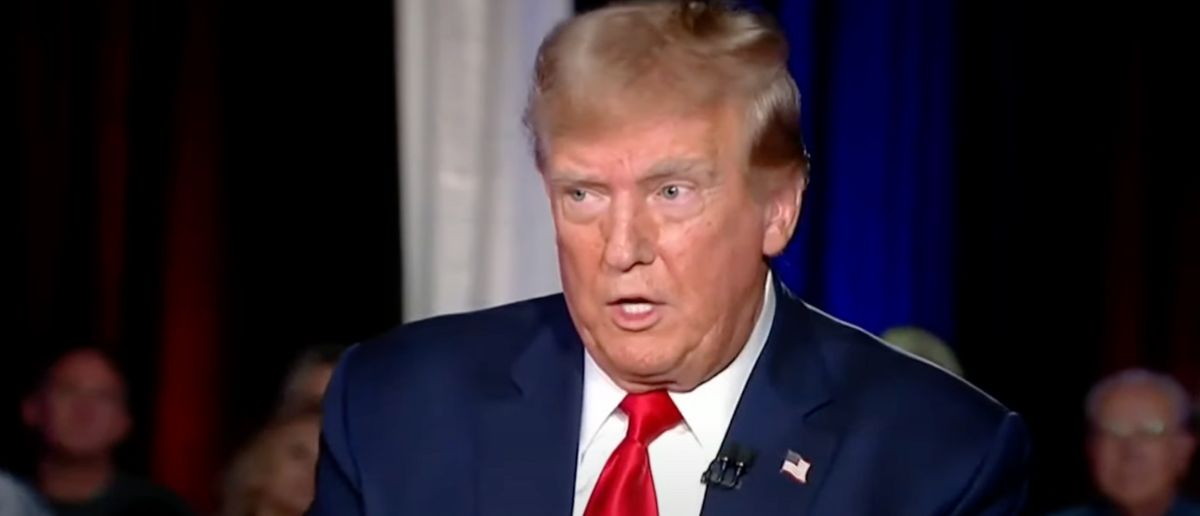
The Republicans have taken back control of Congress. But that’s not the full story.
Because this breaking U.S. Senate news has taken Donald Trump by surprise.
One of Donald Trump’s most frustrating enemies remains in the U.S. Senate. That is Republican U.S. Senator Bill Cassidy from the state of Louisiana. He is one of the Republicans who linked arms with Democrats to vote to impeach Donald Trump during his first term in office. This has earned him a target on his head to be taken out during a primary season.
That’s exactly what he’s going to get too. Cassidy is up for re-election in 2026, but he will be forced to face a tough primary season in which it’s entirely possible he gets taken out. At least one top primary opponent has thrown a hat in the ring, announcing a candidacy for the Louisiana Senate seat now that the 2024 elections are over.
Trump Ally John Fleming Announces Bid To Unseat & Replace Bill Cassidy In Senate
In a political move that has been anticipated for weeks, Republican Louisiana Treasurer John Fleming has officially announced his candidacy for the U.S. Senate in 2026, aiming to challenge incumbent GOP Senator Bill Cassidy. This announcement, first reported by USA Today Network in November, marks the beginning of what promises to be a heated primary race.
Fleming, a physician, and former congressman from Minden, has made clear his intention to use his strong ties to President-elect Donald Trump as a key element of his campaign. Having worked in the Trump administration from 2017 to 2020, where he served in various roles, culminating in his position as deputy chief of staff and assistant to the president, Fleming is positioning himself as a staunch defender of Trump’s “America First” principles.
He expressed pride in his time working in the White House, stating, “I cannot fully express the deep sense of pride I have, having served President Trump in the West Wing of the White House as he was literally fighting for his political life against those who were attacking him and turning their backs on him.” He continued, “But the opportunity to stand with him for the principles of America First is why I seek to serve the citizens of Louisiana in the U.S. Senate.”
In other news,
Louisiana Senator @BillCassidy who voted to impeach President TrumpHas a primary challenger for his Senate seat…
Dr John Fleming, former Congressman and current LA Treasurer, is running for Senate. @LATreasury #lasen pic.twitter.com/tnwkO3zAh2
— Amy Kremer (@AmyKremer) December 4, 2024
Fleming’s strategy for the Senate race includes drawing sharp contrasts with Cassidy, who was one of the few Republicans to vote for Trump’s impeachment during his first term. Cassidy’s vote, which led to his censure by the Louisiana Republican Party, is expected to be a major point of attack for Fleming, who has wasted no time in claiming that Cassidy has “failed the people of Louisiana.” This vote, according to Fleming, is indicative of Cassidy’s inability to align with the core values of the Republican base, particularly Trump supporters.
While Cassidy’s record has been criticized by some, the senator remains undeterred. Bill Cassidy makes the typical RINO appeal whenever one of their ilk faces a tough primary season on the horizon. He appeals to all the “money” he’s earned for his constituents, in this case in the state of Louisiana. The truth is that the spending sprees these politicans agree to are full of wasteful government pork.
In an interview with USA Today Network last month, Cassidy defended his legislative achievements, particularly his role in crafting the bipartisan Infrastructure Act, as well as his success in passing a bill that bans surprise medical billing. Cassidy argued that if Louisiana voters are evaluating candidates based on what they’ve done for the state, “on the over $10 billion that have come to help fix Louisiana’s infrastructure… I feel like I’ll be judged pretty well.” He also pointed to his efforts in securing mental health resources and addressing surprise medical billing, saying, “I look forward to running on my record.”
The challenge to Cassidy’s Senate seat has already attracted other potential Republican contenders, including Lafayette Congressman Clay Higgins and state Senator Blake Miguez from Acadiana. These figures could further complicate the race, drawing support from various factions within the GOP.
As the 2026 election cycle approaches, the rivalry between Fleming and Cassidy will likely intensify, with both candidates using their respective records and political affiliations to appeal to the state’s voters. For Fleming, this race is an opportunity to position himself as a more Trump-aligned alternative to Cassidy, while Cassidy will be aiming to showcase his bipartisan accomplishments and ongoing commitment to Louisiana’s interests.
Republican Party War Rages On Behind The Curtains
The Republican Party has long grappled with an ideological tug of war, with two dominant factions vying for control: the establishment-oriented, traditional Bush-era Republicans and the more populist, liberty-minded wing that has gained strength in recent years. This internal struggle reached its peak with the rise of Donald Trump, a political outsider whose ascendancy can be traced back to the groundwork laid by figures like Ron Paul.
In the 2000s, the Republican Party was defined by the policies of President George W. Bush, whose administration emphasized global interventionism, tax cuts, and the growth of government through programs like Medicare Part D. Bush’s brand of conservatism was rooted in the establishment, seeking to preserve a status quo that valued military strength and a certain level of government intervention. This establishment wing remained dominant for much of the early 21st century, but by the time the 2008 financial crisis hit, discontent among a growing portion of the party began to take shape.
Enter Ron Paul, a libertarian-leaning congressman from Texas, whose 2008 and 2012 presidential campaigns called for a dramatic shift in the party’s direction. Paul’s message of fiscal restraint, limited government, and non-interventionism resonated with a portion of the electorate that felt alienated by both the Republican establishment and the Democratic Party’s policies. He criticized endless wars, proposed eliminating the Federal Reserve, and championed the Constitution as a guiding document for all policy decisions. His fiery rhetoric and passionate following helped ignite the spark for a more grassroots, liberty-oriented movement within the Republican Party. However, despite his influence, Paul was unable to secure the party’s nomination, as the establishment firmly backed candidates like John McCain and Mitt Romney.
But Ron Paul’s movement was far from a fringe phenomenon. His campaigns sowed the seeds of disillusionment with the Republican establishment and fueled a broader dissatisfaction that would eventually give rise to Donald Trump. Trump’s appeal was different in style, but in substance, he channeled much of the anger and frustration that Paul had harnessed — only in a far more populist, outsider manner. While Paul’s rhetoric was steeped in a deep commitment to individual liberties and constitutional conservatism, Trump capitalized on economic populism, a promise to dismantle the so-called “swamp,” and an “America First” philosophy that rejected the globalist policies championed by Bush-era Republicans.
Trump’s ability to speak directly to the discontented base of the Republican Party, who felt ignored by Washington insiders, mirrors the way Ron Paul galvanized voters with his anti-establishment message. But Trump’s success also marked a shift away from the more restrained, idealistic brand of conservatism that Paul represented. Trump’s blend of populist rhetoric, celebrity status, and unconventional political strategy allowed him to dominate the Republican primary field in 2016, ultimately securing the presidency.
The internal battle within the Republican Party has not abated. While Trump’s influence continues to shape the party’s future, echoes of Ron Paul’s vision of limited government and fiscal conservatism still resonate with a subset of the electorate, particularly in the more libertarian-leaning corners of the GOP. This ongoing tug of war between the traditional Republican establishment and the more liberty-minded, populist faction underscores the evolving nature of the party and its struggle to define what it means to be a conservative in the 21st century.
In many ways, the Trump era can be seen as the culmination of the forces set in motion by Ron Paul’s campaigns, a shift from a more internationalist, big-government conservatism to a more populist, nationalist, and economically free-market philosophy. The future of the Republican Party remains uncertain, but it is clear that the battle between these two wings will continue to shape the party’s identity for years to come.
Stay tuned to the DC Daily Journal.





